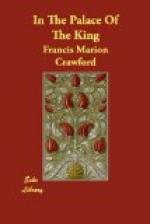energy. The girl was indeed a full-grown woman,
more than twenty years of age, but the early bloom
of girlhood was on her still, and if there was a little
sadness in the eyes, a man could guess well enough
that it rose from the heart, and had but one simple
source, which was neither a sudden grief nor a long-hidden
sorrow, but only youth’s one secret—love.
Maria Dolores de Mendoza knew all of fear for the
man she loved, that any woman could know, and much
of the hope that is love’s early life; but she
knew neither the grief, nor the disappointment, nor
the shame for another, nor for herself, nor any of
the bitterness that love may bring. She did not
believe that such things could be wrung from hearts
that were true and faithful; and in that she was right.
The man to whom she had given her heart and soul and
hope had given her his, and if she feared for him,
it was not lest he should forget her or his own honour.
He was a man among men, good and true; but he was
a soldier, and a leader, who daily threw his life
to the battle, as Douglas threw the casket that held
the Bruce’s heart into the thick of the fight,
to win it back, or die. The man she loved was
Don John of Austria, the son of the great dead Emperor
Charles the Fifth, the uncle of dead Don Carlos and
the half brother of King Philip of Spain—the
man who won glory by land and sea, who won back Granada
a second time from the Moors, as bravely as his great
grandfather Ferdinand had won it, but less cruelly,
who won Lepanto, his brother’s hatred and a
death by poison, the foulest stain in Spanish history.
It was November now, and it had been June of the preceding
year when he had ridden away from Madrid to put down
the Moriscoes, who had risen savagely against the
hard Spanish rule. He had left Dolores de Mendoza
an hour before he mounted, in the freshness of the
early summer morning, where they had met many a time,
on a lonely terrace above the King’s apartments.
There were roses there, growing almost wild in great
earthen jars, where some Moorish woman had planted
them in older days, and Dolores could go there unseen
with her blind sister, who helped her faithfully,
on pretence of taking the poor girl thither to breathe
the sweet quiet air. For Inez was painfully sensitive
of her affliction, and suffered, besides blindness,
all that an over-sensitive and imaginative being can
feel.
She was quite blind, with no memory of light, though
she had been born seeing, as other children.
A scarlet fever had destroyed her sight. Motherless
from her birth, her father often absent in long campaigns,
she had been at the mercy of a heartless nurse, who
had loved the fair little Dolores and had secretly
tormented the younger child, as soon as she was able
to understand, bringing her up to believe that she
was so repulsively ugly as to be almost a monster.
Later, when the nurse was gone, and Dolores was a
little older, the latter had done all she could to
heal the cruel wound and to make her sister know that




